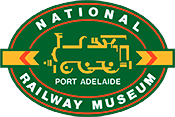South Australian Railways
Broad Gauge
Steam
Class operators: South Australian Railways
Condition: Excellent
Ownership: History Trust of South Australia
Provenance: South Australian Railways
Class: 620
Class Builders: S.A.R. Islington Workshops
Number in class: 10
Number series: 620 – 629
Designer: F. J. Shea
Entered service: 17th July 1937
Condemned: 7th September 1967
Entered the museum: 14th April 1967
Length (over coupling points): 69’ 8’’ (21.234 metres)
Total Weight:140 tons 15 cwt (143,002 kilograms)
Tractive Effort: 25,000 lbs
Wheel Arrangement: 4-6-2
Driving Wheels Diameter: 66″ (1676mm)
Maximum Axle Load: 15 tons 18 cwt (16,154 kilograms)
Boiler Pressure: 200 lbs psi
Cylinders: 2x outside – 18.5″ x 28″ (470mm x 711mm)
Valve Gear: Baker
Coal Capacity: 9 tons (9144 kilograms)
Grate Area: 33.4 square feet (3.102 square metres)
Water Capacity: 5,200 gallons (23,639 litres)
Mileage: 704,164 miles (1,133,242 kilometres)
Maximum Speed: 70 mph (112 km/h)
Two classes of ‘Pacific’ locomotives, both designed by Fred Shea, saw service on the South Australian Railways. The first, the powerful 600-class, built under the Webb administration revolutionized the working of heavy express trains, such as the Overland. The second was the 620-class, 10 of which were built at the Islington Workshops between 1936 and 1938, for use over secondary lines laid with 60 lb rail.
The first of these, No.620, was Australia’s first streamlined locomotive, the smokebox being covered with a chromed steel grille similar to those fitted to motor cars of the period, and painted Hawthorn green with yellow stripes. Upon completion it was placed on display at the Wayville Showgrounds for the duration of the Centenary Exhibition. It entered service on 26th June 1936 hauling the ‘Centenary Limited’, a train made up of refurbished end-loading cars in a livery of green and cream. The remainder of the class were built un-streamlined. All were fitted with Baker´s valve gear, the only South Australian locomotives to be so equipped.
No.624 was placed in service on 17th July 1937 and for the next 30 years performed those duties for which the class had been constructed, working to Gladstone, Morgan, Moonta, Port Pirie, Pinnaroo, Renmark and Victor Harbor. In later years, after the onset of dieselisation, 620s were relegated to working Bridgewater and Willunga locals, mixed trains out of Tailem Bend and occasionally even freight trains. 624 entered the Mile End Railway Museum on 14th April 1967 but was not officially written off until 7th September. It moved to the National Railway Museum on 2nd October 1988.
